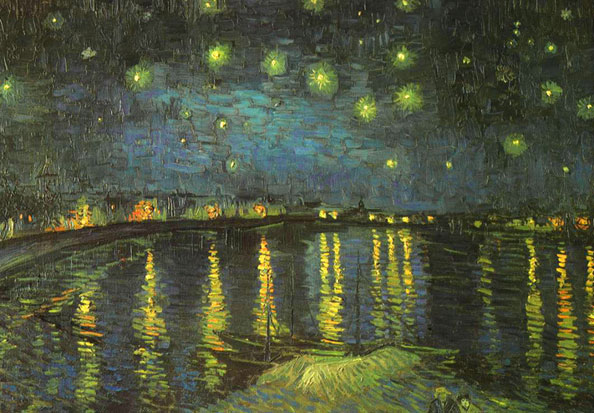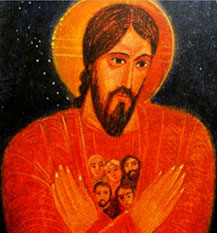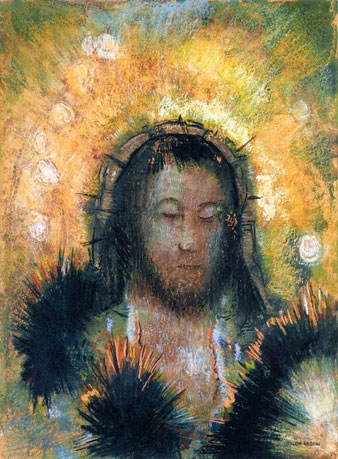
Reflection
by Deborah Beach Giordano
August 19, 2019
Let Me Run Through that Again…
 Upon hearing this passage most of us stop and recite to ourselves the “right” version of the Lord’s Prayer. We know how it is supposed to sound, which words are supposed to be said; anything different is disturbing and disorienting.
Upon hearing this passage most of us stop and recite to ourselves the “right” version of the Lord’s Prayer. We know how it is supposed to sound, which words are supposed to be said; anything different is disturbing and disorienting.
And, as it turns out, that can be a very good thing.
The Lord’s Prayer as we know it is a compilation of the two versions given in Matthew and Luke. The variations between them are slight, but meaningful — especially in the questions they raise.
For example: why, in Luke, is the Father not “in heaven”? The vow that God’s will shall be done isn’t there, either, which seems to eliminate our part in doing the work of the kingdom. Neither does it contain a plea to “deliver us from evil” — which seems like the issue that would be at the top of the Most Requested list. On the other hand, Luke includes detailed language regarding forgiveness that is absent in Matthew. How can these differences help us to understand what Jesus wanted to tell us?
Let’s start at the beginning.
In Heaven?
Where is this God to whom Jesus tells us to pray, the one he often calls our “heavenly Father”? What does it mean to say that God is “in heaven”? Does it mean that God is exclusively in heaven? Is God confined there? Stuck or trapped, unable to function or exert power or control anywhere other than within the celestial heights? Is a heavenly God uninvolved, unconcerned, or uninterested in those here “below”? Or does the Holy One remain in a sky fortress in order to avoid us? Is a “heavenly” Father keeping a safe distance away?
Is God the supreme and lonely “rider on the clouds” described by the psalmist; floating in quiet, nirvana-like bliss, or the fierce and formidable head of an angelic army spoiling for a fight? Is God alone or in the company of friends? Are there allies above, opponents below, or is it every man for himself?
And what about this “heaven,” anyway? Is it a physical place, a finish line to cross, a location we can (or cannot) reach? Or is heaven an utterly-other reality, an eternal-ness outside of our time and troubles? Is it a parallel present beside us always; as close as our breath, as near as a heart-beat?

Is heaven an expansive, glorious cosmos which we simply don’t (yet) have eyes to see? Does its majesty and magnificence occasionally break through and reveal itself, when mystics and visionaries are suddenly struck — dazzled, dazed, babbling, stammering — aflame with a knowledge impossible to transmit?
Is God far-distant, absolutely apart, or in our midst — and is heaven right here, too?
About Evil
Then there is the issue of evil. Luke’s version of the Prayer doesn’t even mention the word, as if it’s of no concern, or as if we can somehow ignore it. But experience teaches that evil won’t go away.
The temptation to do harm has been with us since at least as far back as Cain and Abel, and continues to stalk our streets and our psyches by day and by night. It shows itself in biting remarks, delighting in hurt, inflicting pain, in whispered deceits, in murder and mayhem, violence, it nests in venomous lies.

Evil lurks in the shadows of our favorite good deeds, puffed up with certainty and self-satisfaction, enthralled by our far-flung accusations and condemnations, the poison of hubris seeps into our hearts. We are the righteous: pure of motive, doers of good, free from stain and error. You might even say that we come to think of ourselves “as gods.” (Can you hear that rustling in the tree?)
Evil can disguise itself as the “other” — an outside assailant, the opposition, an enemy — a devil devoid of all redeeming qualities. As long as the other is out there carrying all of those faults and failings, we can comfortably ignore the ways in which they mirror our own.
Evil lives and thrives through our own devices and desires; our need to see the dust in our “enemy’s” eyes, so as to avoid the beam in our own. There is no form of eradication save honesty and self-reflection; turning our intense gaze inward, examining our own hearts as zealously as we monitor the behavior of others.
Oh yes, Lord, please: Deliver us from evil.
Forgive us, because…
Lastly — not in order, but in complexity, is the plea for forgiveness. According to Luke, Jesus said that we are to pray:
And forgive us our sins, because we, ourselves, forgive the sins of those who are indebted to us.
That’s a lot longer than the short and sweet phrasing we know so well:
“And forgive us our debts as we forgive our debtors,”
The short form tends to mislead us. The “because” in the longer version, along with the reiterated “we, ourselves” — us, personally and particularly and nobody else — emphasizes what we may otherwise ignore or overlook: our responsibility.
 Jesus teaches what we might describe as the work of forgiveness. The prayer confirms our commitment to a reciprocal arrangement between our being forgiven and our forgiveness of others. The words are a statement of faith and a pledge that we are the kind of people who do unto others as we would have God do unto us.
Jesus teaches what we might describe as the work of forgiveness. The prayer confirms our commitment to a reciprocal arrangement between our being forgiven and our forgiveness of others. The words are a statement of faith and a pledge that we are the kind of people who do unto others as we would have God do unto us.
In the Lord’s Prayer we lay our lives on the line, asking the Holy One to be as compassionate, as loving, as merciful, as forgiving to us as we are to others. (Or not?)
Treat us with mercy and forgiveness, O Lord, because that is how we treat others.
Whether we use the word “because” or “as,” the essence is the same. According to Jesus, forgiveness isn’t a one-sided action where God does all the work and we sit back and bask in our restored wholeness. Instead, forgiveness is relational, reciprocal. It is as if we (re)connect with God through our connections with one another. It is as if we, the Lord Christ’s followers, are called to be genuinely godly people.
Forgive Us What?
As we’ve seen, what is “owed” to God is right-living and works of forgiveness: to be charitable, compassionate, merciful, loving, and fair. We are to give to others what we want for ourselves — even when we don’t get it in return. The shortfall — our indebtedness to God — comes from those things that we have failed to do.
We also accumulate “debts” in the form of what we ought not to have done. We know these all too well: they claw at our conscience throughout the day and disturb our sleep at night. Yet they, too, have their limits; consigned to God, even the most terrible faults can be redeemed.
Hidden dangers come disguised as noble sentiments, which reveal themselves in our relish of the harm they will inflict. Wickedness can feel warm and fuzzy when we mistake the flames of anger and resentment for the radiant compassion of God. Those are the kind of debts that can quickly mound up.

Then, too, surely we owe a debt of gratitude to the Creator who made us and sustains us, and most certainly for the world we are privileged to live in. We need merely to open our eyes to see the unearned (and undeserved) graces that encircle us.
Forgiving Our Debtors
What do others “owe” to us? This is an important question, since it is connected to our own forgiveness. How can we calculate what is owed to us? What earthly debts can compare to those we’ve accrued to God?
Perhaps the answer is in the audacity of the question; to presume that we are in the same league as God. (Remember the serpent’s enticement: “to be as God”?) Anything owed to us is insignificant compared to what we owe to God. Our desire to be respected, honored, cherished … these are mere supports for our ego; our felt-need to be important, worthy, noble.
Those who have done evil against us, the ones who have injured us, brutalized us, betrayed us — there is nothing that can undo the harm they have done. As with our own wickedness and wrongdoing, the mending begins in the souls of the perpetrators; restoration and redemption is a work between the sinner and her God. In time the debt may be acknowledged and repaid — after first being rectified with God. To hold on to a worthless IOU perpetuates the harm, entwining us with the evildoer. To the degree possible — with God’s help — we must let it go.
❧ ❧ ❧
One more thing: not long ago the current pope made headlines by suggesting a reinterpretation of the phrase:
Lead us not into temptation,
In response to that, what can we say except: No worries, Lord, we can always find the way there on our own!
May Christ’s grace and healing love abound,
Deborah ✝
Suggested Spiritual Exercise
For one week, pray only the Lord’s Prayer with no revisions or additions. Listen closely, and really hear the words.